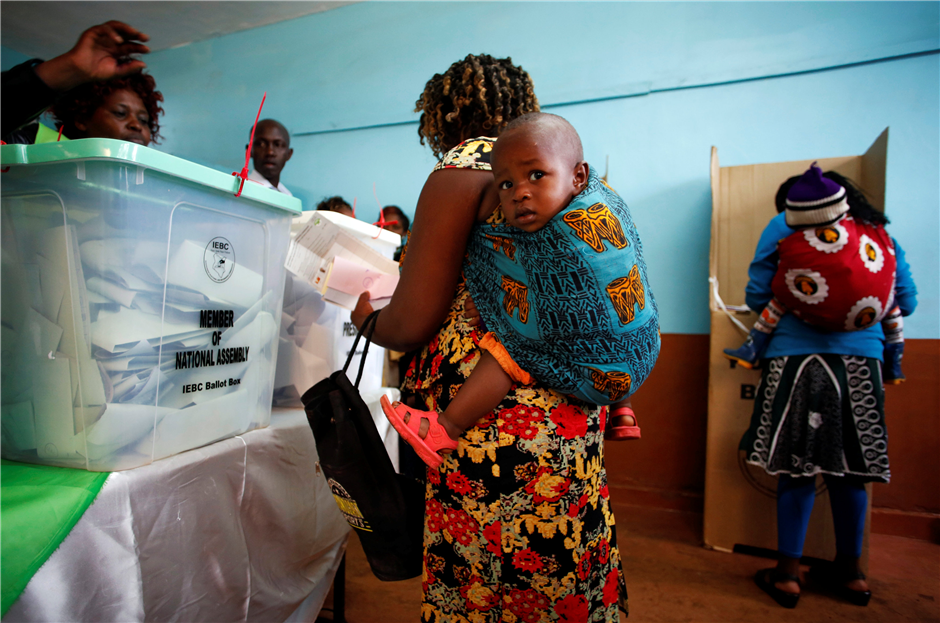Kenyans flock to vote in high-stakes elections

Women carrying babies cast their vote in Gatundu in Kiambu county, Kenya August 8, 2017.
Kenyans thronged polling stations Tuesday to vote in elections dominated by a tight presidential battle between incumbent Uhuru Kenyatta and his rival Raila Odinga that has raised fears of violence in east Africa's most vibrant democracy.
People stood patiently for hours in snaking queues around the country for a vote that went off peacefully, despite reports of some technical glitches and delays, after weeks of tensions over opposition claims of a plot to rig the outcome.
Polls closed at 5pm (1400 GMT), however those in line would be permitted to vote and polling stations which had suffered delays would stay open longer, the election commission said.
All eyes will now turn to the crunch tallying process, the most sensitive part of the election in a country prone to post-poll violence.
Kenyatta, who is seeking a second term in office, urged Odinga to accept the result should he lose.
"I also want to say that if I lose, I will accept the will of the people," Kenyatta said after voting.
Odinga, 72, is taking his fourth and likely final stab at the presidency. He claims elections in 2007 and 2013 were stolen from him.
"In the unlikely event that I lose I don't need a speech, I will just speak from my heart," Odinga said shortly before voting.
Tuesday's elections took place a decade after a shambolic 2007 vote -- which foreign observers agreed was riddled with irregularities -- sparked violence which left more than 1,100 people dead and 600,000 displaced.
This year's campaign was marred by the brutal murder and torture of a top election official in charge of the crucial electronic voting system.
'Good job'
The IEBC electoral commission moved quickly to deal with complaints, removing clerks in a polling station where ballot papers were pre-marked as "rejected".
In the port city of Mombasa a clerk was arrested for issuing double ballot papers to certain voters, local police said.
IEBC chief Wafula Chebukati said voting had gone "smoothly" despite minor delays and technical hiccups at some of the 41,000 polling stations.
In semi-arid northwest Turkana heavy rains saw flooding cut roads off, and several polling stations had still not opened by closing time.
Odinga's National Super Alliance opposition coalition (NASA) released a statement praising poll officials and security forces.
"We commend them for the good job so far and urge them to keep it up," it said.
However the coalition complained some of its voters had been turned away or their names were missing from the voters register.
NASA also said it had reports of "pre-marked ballot papers" and attempts to bribe voters.
As vote tallying starts, the focus is on the electronic system in place to send results to Nairobi. The failure of this system in 2013 meant votes had to be counted manually, leading Odinga to cry foul.
'Same old faces'
The devolution of power to Kenya's 47 counties after a post-conflict constitutional reform means elections are now a complex affair, with citizens casting six different ballots.
The presidential election is set to be the final showdown of a dynastic rivalry that has lasted more than half a century since the candidates' fathers Jomo Kenyatta and Jaramogi Odinga went from allies in the struggle for independence to bitter rivals.
The men belong to two of Kenya's main ethnic groups, Kenyatta from the Kikuyu, the largest, and Odinga from the Luo.
Both have secured formidable alliances with other influential communities in a country where voting takes place largely along tribal lines.
At a polling station in the capital, 54-year-old Concepta, who did not give her surname, was one of those still waiting in line, and said she still did not know who she would vote for.
"It's the same old faces, again and again. I was hoping there would be someone new but unfortunately, it's Kenyatta/Odinga again," she said.
"We have prayed about this. We really hope there won't be any violence."
Kenyatta, 55, is seeking re-election after a first term in which he oversaw a massive infrastructure drive and steady economic growth of more than five percent.
"Kenyatta has done a tremendous job, he has improved communications, built roads and other infrastructure, he has to keep the job," said Sashikat Bhaga, 68, in the Nairobi suburb of Parklands, home to many Kenyans of Indian or Pakistani origin.
However he has been criticised for soaring food prices -- with prices jumping 20 percent year-on-year in May -- and massive corruption scandals on his watch.
More than 150,000 members of the security forces were deployed for polling day.
There are more than 19 million registered voters in the nation of 48 million. Half are aged under 35.
Initial results had already begun trickling in. Election officials have one week to announce the final tally.















